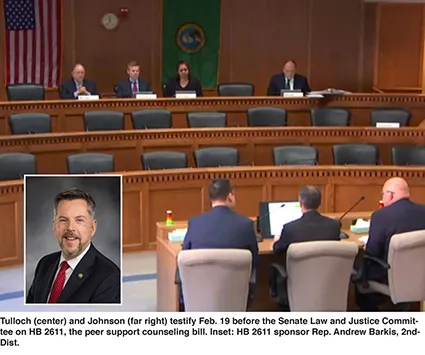Privileged communications for peer support counseling

How one DOC member’s story moved his legislator to action
The sponsor of the good bill that already unanimously passed the House said the idea of protecting the integrity of post-incident counseling and peer support came from a new awareness brought to him by one of his constituents.
Rep. Andrew Barkis of the 2nd Dist. said John Tulloch, a Community Corrections specialist and member of Local 443, told him that the dangerous work he and his colleagues do often involves “critical incidents” that may involve use of force.
“I was very surprised,” Barkis told the Senate Law and Justice Committee Monday (Feb. 19). “I had no idea.”
Barkis said he was also surprised to learn that unlike other law enforcement professionals, Tulloch and his colleagues don’t enjoy the same kind of privileged communications, like the attorney-client privilege.
That made them “very skeptical” when talking to peer support counselors.
Barkis praised Tulloch for doing what citizens should do when they see something as important as this that should be changed for the good: Calling on legislators to listen and act.
Tulloch as he did in the House hearing explained to the Senate committee that DOC staff are still held to the same standard as other law enforcement professionals.
“We should be able to talk to a counselor as soon as possible and those statements should be protected,” Tulloch said.
Law enforcement professionals in other agencies, including Parks and the Liquor and Cannabis Board, also face the same lack of privileged communications for peer support counseling.
“Peer support by its very nature is comforting and provides a person with a person who understands what they are going through and allows them to validate and support that person,”said Ton Johnson, the Federation’s law enforcement labor advocate. “That’s critical in ensuring that staff feel protected.”
The committee has set a vote for Thursday (Feb. 22).
